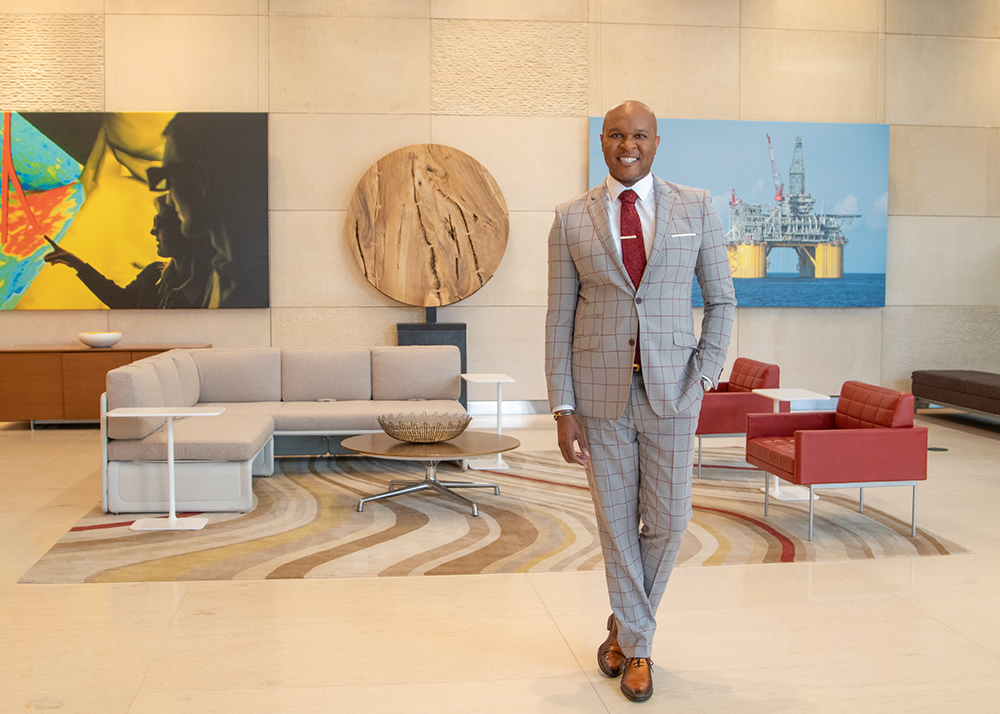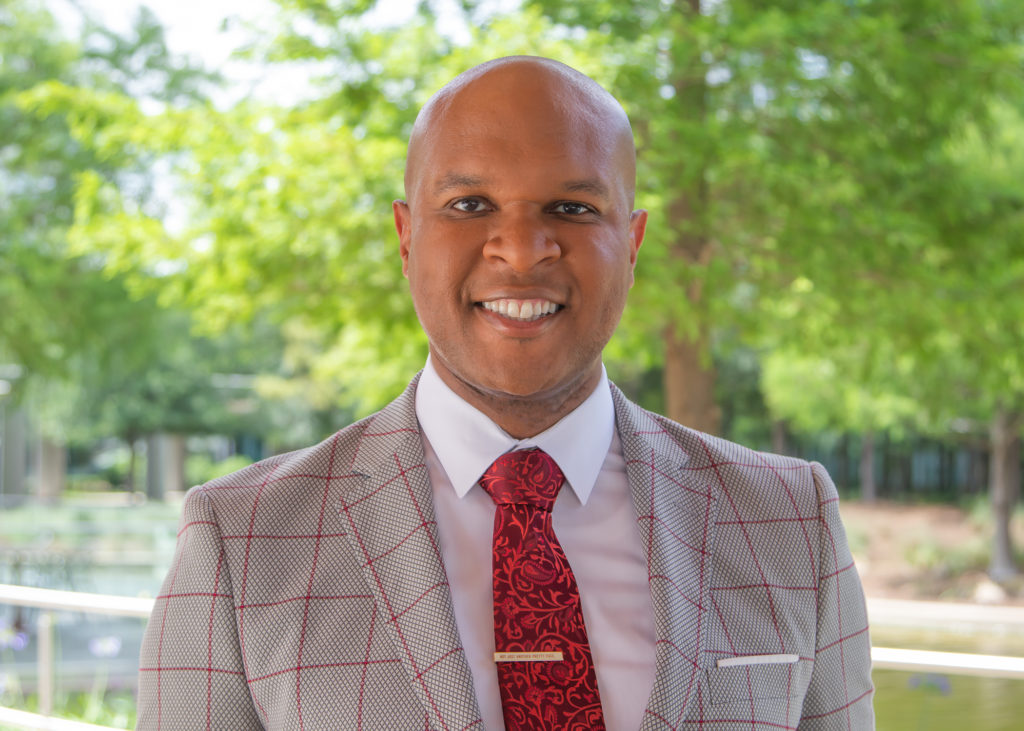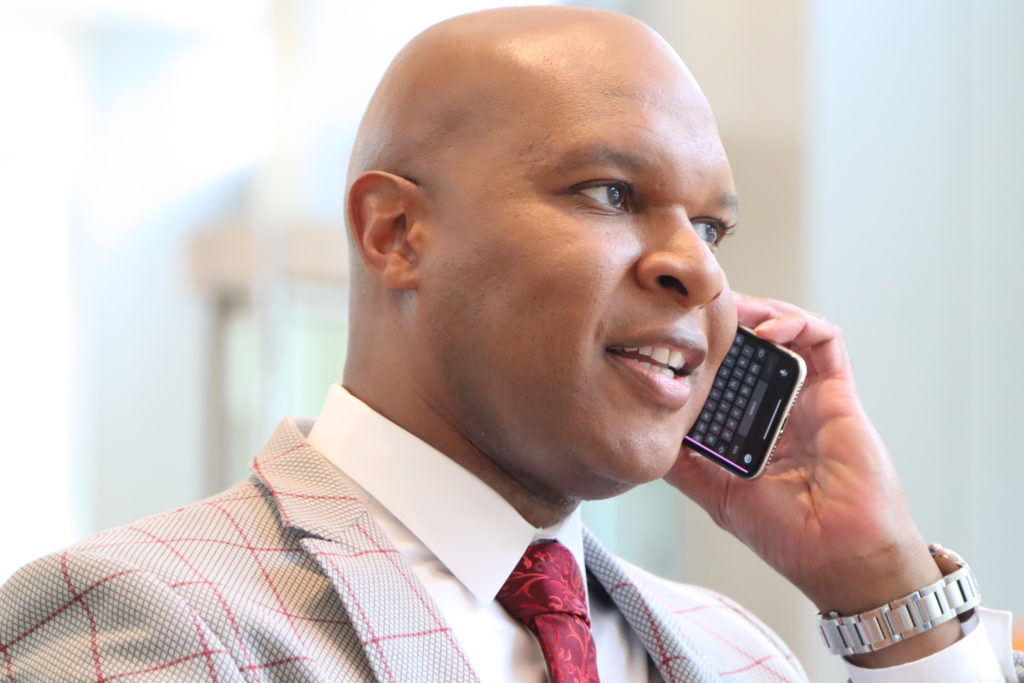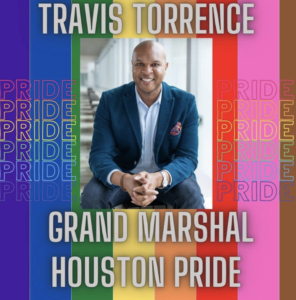
Travis Torrence learned about the power of the law while he was still in high school when his aunt, a small-town Louisiana school teacher-turned-political activist, sued her local government under the Voting Rights Act for its “at-large” election system.
“She won,” Torrence said. “That was the first time I noticed the law being used to effectuate societal change — change that for that community was historic. I remember thinking that the law was the key to justice, fairness, equity and equality. And if I wanted to be an agent- of-change, I had to understand the law and the policy issues that informed it.”
In 1994, Torrence saw his aunt, Betty Cooper-Coleman, become the first Black person elected as a Gramercy city alderman. In college, he did a presentation on his aunt and the historic litigation, and he interviewed Cooper-Coleman as part of it.
“Her takeaway message was to not be afraid to stand up for what’s right and use your voice for the voiceless and those who are on the journey to finding their own voices,” he said.
Torrence, who is now the leader of Shell USA’s global litigation bankruptcy and credit team, has done just that.
“Travis’ dedication to improving diversity in the law is unquestionable,” said Holland & Knight partner Annapoorni Sankaran. “He continuously dedicates his time and effort to both pipeline programs and professional programs which support the LGBTQ community and other social justice aspects.”
The Association of Corporate Counsel’s Houston Chapter and The Texas Lawbook agree and have named Torrence as one of two finalists for the 2022 Houston Corporate Counsel Award for Achievement in Diversity and Inclusion.
ACC Houston and The Lawbook plan to honor Torrence and the finalists in a dozen award categories May 19 at a ceremony at the Four Seasons in Houston. The winners will be announced that evening.
Premium Subscribers: Click Here for a Q&A with Travis Torrence, where he discusses his career mentors, what he looks for in hiring outside counsel and how law firms can improve retaining diverse talent.
Torrence is on a roll. In April, he was elected to serve as the Grand Marshall of the Houston Pride Celebration set for June 25.
He is the great-grandson of Mississippi sharecroppers and the great-great-grandson of slaves who worked on plantations in Louisiana. “Neither of which is lost on me when I walk into spaces that have not traditionally been occupied by Black, gay men who grew up in the South,” Torrence said.
Despite being only 41, Torrence has established himself as one of the premier experts in corporate bankruptcy and restructuring and a leader in diversity, equity and inclusion in the corporate law profession. He is president-elect of National LGBT+ Bar Foundation’s board of directors and is past co-chair of the Texas Minority Counsel Program. He has demonstrated his commitment to legal services to the poor and vulnerable by serving as past chair of the Houston Bar Foundation and currently as a board member of the Texas Access to Justice Foundation.
“Travis leads on issues involving DEI by living DEI,” said Norton Rose Fulbright partner Anne Rodgers. “Several Shell executives have mentioned to me how much they appreciate the time and effort Travis devotes to his role in Shell’s DEI network.
“But for Travis, diversity is not just about his job or just about the legal community,” Rodgers said. “When Travis gets a group together, for business or pleasure, the group is almost always diverse in numerous respects — race, gender, sexual orientation, age, religion, ethnicity and so forth.”
Torrence, in an exclusive interview with The Texas Lawbook, said he is “cautiously optimistic that this latest reckoning with race has led us to a pivotal moment in enhancing representation in firms and corporate legal departments.”
“It seems like now more than ever before, employees, suppliers, customers and the communities in which we operate are making decisions to partner with organizations that share values similar to their own, including a commitment to diversity, equity and inclusion,” he said. “I’m encouraged by the number of legal departments that are making public pledges that clearly state their expectations regarding the diversity of the legal teams that work for and with them.”
A “huge misunderstanding” regarding DEI, according to Torrence, is that only people from “traditionally underrepresented backgrounds” can work or lead diversity issues.
“Although we do have the benefit – or the burden — of some of our lived experiences, which gives us meaningful insight into how it feels to be ‘othered’ or excluded, we need everyone to share their experiences and ideas on how to make our organizations more inclusive and equitable, including the thoughts of straight, white, cisgender men,” he said.
Torrence said many lawyers wrongly believe that once DEI targets are met that there will come a time when they can stop working on issues of inclusion, equity and representation.
“These issues are complex and multifaceted,” he said. “They exist in society independently from our organizations and didn’t come to being overnight. It will take collaboration, creativity, thoughtfulness and time to dismantle barriers to equity and diversity. And, although we might make significant progress on this journey, there will always be more we can do in this space to enhance inclusion and the experiences of our colleagues, customers, suppliers and fellow citizens.”

Torrence was born and grew up in Kenner, Louisiana, which is about 15 miles west of New Orleans and home to the Louis Armstrong International Airport.
His dad was a truck driver. His mom was a public high school teacher and administrator for 30 years. She died of colorectal cancer the year she was set to retire.
Torrence attended “extremely diverse” public schools, where he played basketball, football, baseball and track through middle school and switched to playing the tuba in band in high school. He was elected student body president in his elementary, middle school and high schools. He was the first Black valedictorian at his high school.
On Torrence’s first day of college at Tulane University, his parents sat him down in their living room.
“We’re making significant sacrifices to send you to college to make a better life for yourself,” they said.
His parents worked multiple jobs “to ensure I would be set up for success in college,” he said.
“While I figured they simply wanted me to get a good job to earn a decent living, the subtext of their statement was all about that old adage, ‘We make a living by what we get, but we make a life by what we give,’” he said. “That’s why I dedicate my service in the community — whether it’s pro bono work, diversity work or serving on the boards of or volunteering with various nonprofits — to my parents.”
Majoring in communications in college, Torrence worked as a disc jockey at a Top 40 rock format radio station.
“Although I wanted to be a television news anchor, my parents constantly asked me whether I was going to be a lawyer, doctor or unsuccessful,” he said.
When Torrence’s parents saw his college majors were communication and political science, his mother — the math teacher — said she had an important equation for me to memorize: “communication + political science = unemployed.”
Torrence said he loved being an on-air radio personality, but “the combination of my parents’ influence and learning more about the life of radio DJs convinced me that I needed to at least try law school on for size. I never intended to like the practice of law. But, after my first summer as a summer associate, I thought more seriously about the opportunities associated with working in Big Law.”
When Torrence went to Yale Law School, corporate bankruptcy was the furthest thing from his mind.
But Yale adjunct bankruptcy professor Eric Brunstad taught Introduction to Bankruptcy Law through “storytelling and by using examples from his past cases.”
“He was so passionate about his practice, which I also found fascinating compared to many of my other professors who seemed to care more about their research than the courses they were teaching,” Torrence said. “The equitable principles of bankruptcy seemed intuitive to me and also resonated with my personality.”
A Yale classmate advised Torrence to consider Houston as a potential job market and recommended he apply for summer associate spots with Baker Botts, Fulbright & Jaworski and Locke Liddell.
Fulbright — now Norton Rose Fulbright — offered him the summer associate opportunity, which he accepted. And he asked to be assigned to the bankruptcy practice.
“I felt a true sense of community and care [at Fulbright] as I was surrounded by partners like Shauna Clark, Anne Rodgers, Zack Clement and Evelyn Biery,” he said.
Upon graduating from Yale Law School in 2005, Torrence did a one-year clerkship with Judge Edward Prado of the U.S. Court of Appeals for the Fifth Circuit.

“I started my Fifth Circuit clerkship about two weeks after Hurricane Katrina hit my hometown of New Orleans,” he said. “When my cell phone started working again, one of the first calls I received was from a Fulbright partner asking me whether she could send money to my family and me to ensure we had everything we needed after the storm.”
Just the offer, according to Torrence, was enough for him to pick Fulbright as his future employer.
Torrence said he “truly loved private practice and especially loved my Fulbright family” for the seven years he was an associate in the firm’s Houston office.
By 2013, Shell’s legal department was sending Torrence a significant amount of work. That spring, a managing counsel at Shell asked him about his interest going in-house.
Torrence was apprehensive about leaving Fulbright, but he also knew there are few in-house corporate legal departments for bankruptcy lawyers.
“I figured that if I didn’t like being in-house, I could always go back to private practice and didn’t want to regret missing out on what ended up being a life-changing experience,” he said.
Nearly nine years later, Torrence said he has never regretted his decision. Neither has Shell.
During his first two years at the energy giant, he created a robust case management process on credit, treasury and bankruptcy matters affecting Shell’s downstream business. The result: He reduced the company’s outside legal spend on those disputes by more than 80 percent.
“Before my tenure at Shell, the company did not have efficient protocols in place for handling bankruptcy cases in which Shell had an interest,” he said. “Instead, Shell received notice of bankruptcy cases through copies of pleadings that were mailed to various individuals throughout the company, hired outside counsel to handle almost every case in which the company had a significant financial or reputational interest, and did not have a formal system for monitoring the progress of cases or updating internal stakeholders.
“Because many of the pleadings were ignored, the company missed out on opportunities to recover financial distributions to creditors, failed to mitigate potential reputational damage and spent very large sums on outside counsel fees,” he said.
Torrence developed a formal protocol for handling new bankruptcy cases. He converted Shell to the federal courts’ electronic paperless noticing system, created a method for determining the company’s interest in each case and tracked the status of cases through bankruptcy courts across the country.
The standardized process that Torrence created, he said, resulted in more engagement by leaders of internal business units and increased recoveries of debts owed to the company by debtors in bankruptcy.
In 2015, Shell promoted Torrence to manage day-to-day legal operations for Shell subsidiary Jiffy Lube, where he led the legal team’s involvement in the introduction and implementation of a new suite of services called “Jiffy Lube Multicare.”
The initiative required Torrence and his team to negotiate changes to franchise agreements, to conduct a comprehensive review of the Jiffy Lube policies and procedures manual and to modify certain disclosure documents.
“It was a huge piece of work, the success of which was key to the ongoing success of the brand,” he said. “Around the same time, we also launched a new products offering for the sale of lubricants to our franchisees, which kept me extremely busy but proved to be an exciting time to be a part of that business unit.”
In October 2018, Shell again promoted Torrence, this time to lead its global litigation bankruptcy and credit team. His primary mission is protecting Shell’s financial and operational interests when business partners face bankruptcy and restructuring.
Since 2019, he has been busy.
“Over the past 3 years, there has been an elevated flow of insolvency matters affecting our trading businesses, which, despite the potential negative impact on our businesses, has been challenging and exciting from a practitioner’s perspective,” he said. “Covid-19 and liquidity issues faced by oil producers due to volatility in the crude market triggered the rise in the number of bankruptcy cases filed in 2020.”
“Winter Storm Uri and the continued coronavirus pandemic caused the vast majority of the filings in 2021,” he said, “many of which involved reputational concerns due to publicity surrounding the winter weather event and presented novel legal, regulatory and commercial challenges that have rarely been seen in U.S. bankruptcy courts.”
Lawyers and judges say Torrence is clearly one of the nation’s leading bankruptcy legal experts.
“Travis continually impresses me on challenging bankruptcy matters,” said Ryan Manns, who is co-head of Norton Rose Fulbright’s financial restructuring and insolvency practice. “He is extremely organized, which is important because he supervises so many matters. He has a very strong technical skill set, as well as considerable experience on very complex restructuring matters. Because of his expertise and breadth of experience, he consistently exercises good judgment.”
In nominating Torrence for the 2022 Houston Corporate Counsel Award for Achievement in Diversity and Inclusion, Sankaran said people would be “hard-pressed to find an individual in Houston who has accomplished as much as Travis has in his short career as a lawyer.”
For example, Shell appointed Torrence to lead its legal team’s Diversity Focal Point Network for North and South America. He was responsible for the coordination of all diversity and inclusion efforts taking place within the legal department.

But Sankaran said Torrence’s biggest DEI successes during the past year has been his establishment of Coaching Circles, a mentorship program.
“Recognizing that LGBTQ+ attorneys of all ages and races are likely to feel isolated in the legal community, Coaching Circles endeavors to assist LGBTQ+ attorneys with developing supportive relationships, giving and receiving professional guidance and creating a safe place for LGBTQ+ specific concerns among attorneys,” Sankaran wrote in the nomination.
“Instead of replicating the traditional one-on-one mentoring paradigm, Travis’s innovative program leads several groups comprised of five attorneys each through a series of teambuilding, social and community service activities,” she wrote. “Although Travis has worked with other attorneys to develop the curriculum … he has used his own money to underwrite many of the events associated with the program.”
“Thus far, this latest initiative that Travis has implemented, perhaps his most groundbreaking, has been a smashing success and has filled a unique need,” Sankaran wrote.
McGuireWoods partner Demetra Liggins said Torrence “has a big heart for people.”
“Travis is extremely passionate about creating an impact in the field of diversity and inclusion,” Liggins said. “This passion is demonstrated his mentoring and advocating for lawyers from these groups and helping them advance in their careers. He also knows that DEI is a business imperative that leads to better outcomes for companies and their customers. The journey towards improved diversity and inclusion requires courageous leadership and Travis is that and more.”
But everyone agrees that the best promotion of diversity and inclusion is Torrence himself.
“Travis brings his authentic self to the table,” Rodgers said. “And Travis’s success in doing that emboldens others to do the same.”
